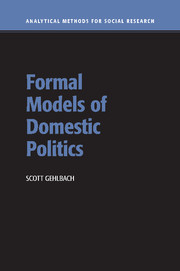5 - Delegation
Published online by Cambridge University Press: 05 March 2013
Summary
In this chapter, we continue to consider environments with multiple policy makers, though the emphasis is different from that in Chapter 4. Rather than assuming that the agreement of all actors is necessary to change policy, the models here assume a single principal, which may either act on its own or delegate policy authority to an agent. In political science, the principal is typically a legislature, whereas the agent is either a bureaucratic agency or a committee with expertise in some policy arena.
From the legislature's perspective, delegating policy authority involves a trade-off. On the one hand, the agent's expertise implies that it can choose a policy better suited to the state of the world. Even with substantial staff resources, the typical member of a legislature may be poorly equipped to respond to fast-changing technological or economic conditions. On the other hand, the preferences of the legislature and the agent may not be perfectly aligned. When the agent is a bureaucratic agency, we say that this creates the possibility of bureaucratic drift—that is, the possibility that the ultimate policy outcome may be different from that desired by the legislature. Much of the literature explores the impact of various mechanisms and institutions on this trade-off.
We begin by presenting a simple spatial model of delegation, where for concreteness we refer to a relationship between a legislature and an agency. We then expand this baseline model in various ways. We consider the use of discretion limits as an instrument to prevent bureaucratic drift; we explore issues of legislative and bureaucratic capacity; and we examine the ways in which agency incentives can be structured by administrative procedures.
- Type
- Chapter
- Information
- Formal Models of Domestic Politics , pp. 98 - 121Publisher: Cambridge University PressPrint publication year: 2013

